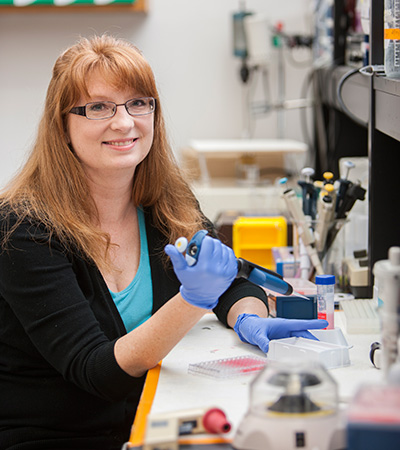Diagnosis turns scientist into counselor and comforter
By Jan Jarvis

For seven days, Rebecca Cunningham lay in bed, radioactive and isolated.
“No one could get within six feet of me,” said Cunningham, PhD, who was undergoing radiation therapy for thyroid cancer. “I watched Netflix, slept and sucked on sour candy.”
The isolation was hard. Even harder was the restrictive low iodine diet that she had to follow before her radiation.
But there was one advantage she had over many of the 62,000 people with thyroid cancer: Her background as a scientist helped her better understand the diagnosis she faced as a patient.
It’s that unique perspective that Dr. Cunningham, a researcher at UNT Health Science Center, has brought to the Low Iodine Diet (LID) Life Community, a support group she founded on Facebook in June. In just six months, the site has expanded to nearly 2,000 members and 45 administrators from as far away as Canada, United Kingdom and Australia.
The online posts illuminate the isolation, confusion and desperation of individuals facing thyroid cancer, sometimes known as a “good cancer” due to its high survival rate. On the pages of the site, patients have found a place to vent, celebrate and ask questions that previously had gone unanswered.
Dr. Cunningham is cautious not to offer medical advice and always defers to each person’s physician. But this research scientist and Assistant Professor in the Center for Alzheimer’s and Neurodegenerative Disease Research now has added counselor and comforter to her many credentials. She understands in a way few can.
“There is an area between the doctor and the patient where there’s often a big divide,” she said. “I feel like I stand in that big divide because I understand thyroid cancer as a patient and researcher.”
From shopping list to support group
By day, Dr. Cunningham teaches classes and works in her lab, where her work focuses on steroid hormones and their effects on the aging brain.
But during her downtime, she answers messages from anxious thyroid cancer patients. She never planned on any of this.
The LID Life Community, all started with a simple shopping list that she posted to Facebook. It was a cheat sheet for when she was at the grocery store selecting foods for the low iodine diet that she was going on for two weeks to increase the effectiveness of her radioactive iodine treatment.
“I put the photo album of low iodine foods on my timeline so when I went shopping I knew what to buy,” she said. “The next thing I knew, all these people were friending me.”
The diet, which depletes the body of iodine, is recommended by the American Thyroid Association. But it’s tough to follow and requires the elimination of dairy, sea salt, cured meats, most chocolate and other common foods. Dr. Cunningham identified hundreds of low iodine foods and contacted restaurant chains to see what options they offered.
She soon realized that a lot of people were confused about what was safe. Even more clear was that they were looking for help beyond the diet. They wanted support, especially during the isolation period required following radiation therapy.
“A lot of people going through this are young women with kids and they’re very scared,” Dr. Cunningham said. “It’s depressing and lonely being separated from their babies.”
Isolated and misunderstood
Hilda Butt, a papillary thyroid cancer patient from Newfoundland, Canada, said she lived on unsalted nuts and raisins while on the diet two years ago. Recently, when she had to repeat the diet, she discovered Dr. Cunningham’s page and the support she longed for.
“LID is a scary time and knowing there are foods we can eat and that there are people to depend upon is of utmost importance,” she said. “This time when I followed LID, I was never hungry and if I had any questions, there was a group I could rely upon to find the answers.
“The site helped me and I wanted to give back. I now help others navigate the diet.”
Sara Armeni, who lives in Richmond, Mich., had a similar experience.
“I would walk the grocery store for hours reading ingredients, then leave the store crying with no food,” she said. “The diet nearly broke me – mentally and physically.”
Today Armeni helps others through LID because she knows firsthand “all the pain, confusion and agony” that goes with the disease, she said.
For many patients, the time spent in isolation while radioactive is the most difficult. Dr. Cunningham devised a support strategy for that as well.
“I do a weekly blast that lets everyone on the site know who’s having radiation each week so they can private message each other and get support during isolation,” she said. “It allows them to connect with someone at the moment when they’re feeling so alone.”
Even with support, it’s easy for thyroid cancer patients to feel alone because the disease is so misunderstood. Although the five-year survival rate is nearly 100 percent, there’s also a 30 percent chance of a recurrence.
Thyroid cancer is hard enough without stressing over the low iodine diet, Dr. Cunningham said.
“A lot of people with thyroid cancer feel like what they are going through is downplayed and dismissed by everyone,” she said. “But when they come to the LID page, it’s one of the few times when they don’t feel that way. They feel understood.”






Social media